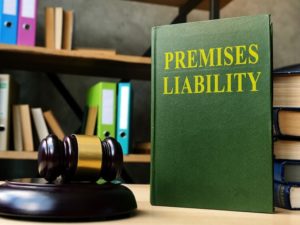What Do You Have to Prove in a Premises Liability Claim?

As a personal injury firm, we handle a constant stream of premises liability claims. However, most people aren’t as familiar with these types of claims and how they work, especially compared to car accidents and other injury cases. Essentially, premises liability claims arise whenever an individual suffers injuries on another’s property, as a result of negligent or unsafe conditions on said property. If the injured party (plaintiff) has a successful claim, the property owner or operator is then liable for their damages.
Before we discuss these claims in more detail, we must first mention that the award-winning premises liability attorneys from Van Law Firm can help answer any claim-related questions you may have. Simply call our office nearest you today for more information.
What Are the Elements of a Premises Liability Claim?
It’s tricky to make broad generalizations about personal injury law, as policies vary by state. However, for the most part, a premises liability claimant will need to show proof of the following:
- The individual at fault (defendant) either owned, occupied, or leased the property in question;
- The defendant was somehow negligent in their use of said property;
- The plaintiff was in fact injured while on the property in question; and
- The negligence of the defendant was a primary factor in causing the plaintiff’s injuries.
Now, let’s take a closer look at each of these elements.
Defendant’s Connection to the Property (Own, Occupy, Lease)
For a free legal consultation, call (725) 900-9000
The first element you must establish is that the defendant was actually connected to the property where your injuries occurred, otherwise there is no liability to be argued. In a legal sense, if you can prove that the defendant either owned, leased, or occupied the property, you can successfully argue that they had an obligation to maintain a safe environment.
Negligent Use of Property
Next you must show that the defendant was somehow negligent in their use of the property. Negligence is a general concept that is applied to nearly all personal injury cases–for a premises liability claim, you must prove that the defendant did not meet the duty of care required for their position. Generally speaking, this includes inspecting the property to ensure that it is hazard-free and expressly notifying any visitors about potential hazards. However, the defendant’s duty of care may differ depending on the status of the person entering the property, which we will discuss next.
Defendant’s Liability Based on the Status of the Person Entering the Property
In many jurisdictions around the country, the defendant’s duty of care is measured in accordance with the status of the person entering the property. There are three categories of status:
- Invitees: Whenever a person enters a property and the owner or operator financially benefits from it, that person is then considered to be an ‘invitee.’ This status applies to most patrons, such as retail shoppers, hotel guests, restaurant guests, etc. Given the fact that invitees are paying to access a certain property, they are obligated to receive the highest level of care. This means that property owners and operators are obligated to actively maintain the property and ensure that it is safe at all times.
- Licensees: Licensees are individuals who enter a property with either express or implied permission from the owner or operator. This title generally applies to social guests and acquaintances. Whenever licensees are present, the defendant has an obligation to fix any known hazards or properly warn guests about them. However, this status is subject to change if the licensee is asked to leave the premises and does not.
- Trespassers: If an individual unlawfully enters a property, or refuses to leave after being asked, they are then considered to be trespassing, and property owners have no obligation or duty of care to adhere to.
Click to contact our personal injury lawyers today
Claimants should note that some states are moving away from the concept of status and are now adjudicating all claims on the grounds of ordinary negligence. This premise relies on the concept of reasonable care on behalf of both parties, meaning that defendants have a duty to warn about hazards that could not be reasonably discovered, and plaintiffs have a duty to exercise reasonable care when they are on another’s property.
Plaintiff Suffered Injuries
For all injury claims, you must prove that you did in fact suffer demonstrable injuries. This can be done through medical records, testimony from experts, or testimony from any treating physicians.
Negligence of Defendant Contributed to Plaintiff’s Injuries
Complete a Free Case Evaluation form now
The final element you must prove is that the defendant’s negligence played a large role in your injuries. In other words, how exactly did their actions or inactions cause you to suffer harm? Keep in mind that this does not not to be the sole cause, there just has to be a provable correlation between the two.
Questions? Contact Experienced Premises Liability Attorneys Today
If you have further questions about premises liability claims, or would like to schedule a risk-free consultation, simply contact the trusted team of premises liability attorneys from Van Law Firm right away. We’ve defended claimants’ rights for years, and with over $150 million recovered so far, it’s clear to see that our track record speaks for itself. Call our office nearest you today to learn how VLF can help.
No obligation consultations are always free.
Let Us Help You! Call Now: (725) 900-9000


